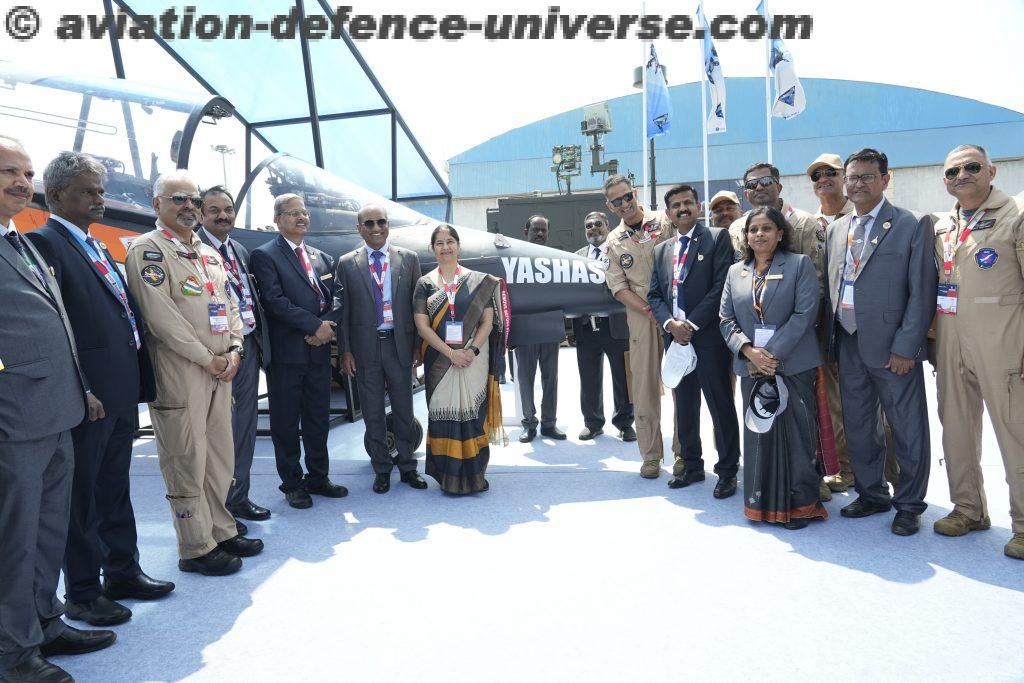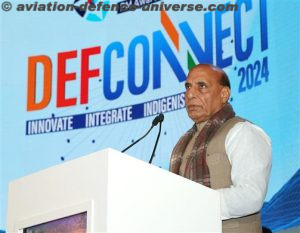- Start-ups can now receive grant-in-aid of up to Rs 25 crore
- ADITI scheme will nurture youth’s innovation & help India leap forward in the field of technology: Shri Rajnath Singh
- “India must achieve technological edge to become a developed nation; Need to transform our country into a knowledge society”
- “Without self-reliance, India cannot take independent decisions on global issues in line with national interests”
- 11th Defence India Start-up Challenge with 22 problem statements unveiled
New Delhi. 04 March 2024. Defence Minister Rajnath Singh launched Acing Development of Innovative Technologies with iDEX (ADITI) scheme to promote innovations in critical and strategic defence technologies, during DefConnect 2024 in New Delhi on March 04, 2024. Under the scheme, start-ups are eligible to receive grant-in-aid of up to Rs 25 crore for their research, development, and innovation endeavours in defence technology. “The scheme will nurture the innovation of youth, and help the country leap forward in the field of technology,” the Defence Minister said as he addressed a gathering of industry leaders, entrepreneurs, innovators, and policymakers.
 The ADITI scheme worth Rs 750 crore for the period 2023-24 to 2025-26 falls under the iDEX (Innovations for Defence Excellence) framework of Department of Defence Production (DDP), Ministry of Defence. It aims to develop about 30 deep-tech critical and strategic technologies in the proposed timeframe. It also envisages to create a ‘Technology Watch Tool’ to bridge the gap between the expectations and requirements of the modern Armed Forces and the capabilities of the defence innovation ecosystem. In the first edition of ADITI, 17 challenges – Indian Army (3), Indian Navy (5), Indian Air Force (5) and Defence Space Agency (4) – have been launched.
The ADITI scheme worth Rs 750 crore for the period 2023-24 to 2025-26 falls under the iDEX (Innovations for Defence Excellence) framework of Department of Defence Production (DDP), Ministry of Defence. It aims to develop about 30 deep-tech critical and strategic technologies in the proposed timeframe. It also envisages to create a ‘Technology Watch Tool’ to bridge the gap between the expectations and requirements of the modern Armed Forces and the capabilities of the defence innovation ecosystem. In the first edition of ADITI, 17 challenges – Indian Army (3), Indian Navy (5), Indian Air Force (5) and Defence Space Agency (4) – have been launched.
Rajnath Singh asserted that to motivate young innovators, iDEX was expanded to iDEX Prime, with the assistance increasing from Rs 1.5 crore to Rs 10 crore. Following the encouraging participation in providing solutions to the challenges given by the Services and DPSUs, ADITI scheme has now been launched, he said.
The Defence Minister stated that the idea behind the schemes/initiatives such as ADITI, iDEX, iDEX Prime
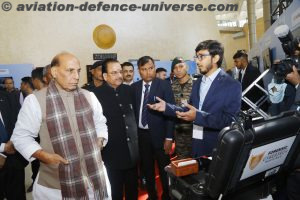 is to also transform India into a knowledge society. “As times are changing, new technologies are coming into existence. To become a developed country, it is necessary for us to achieve a technological edge. We have to transform our country into a knowledge society,” he said.
is to also transform India into a knowledge society. “As times are changing, new technologies are coming into existence. To become a developed country, it is necessary for us to achieve a technological edge. We have to transform our country into a knowledge society,” he said.
The event also witnessed the launch of the 11th edition of Defence India Start-up Challenge (DISC), heralding a new chapter in the collaboration between the defence establishment and the start-up ecosystem. The DISC 11 introduces 22 problem statements – Indian Army (4), Indian Navy (5), Indian Air Force (5), Armoured Vehicles Nigam Limited (7) and Hindustan Shipyard Limited (1) – aimed at addressing critical defence challenges, inviting innovators to propose innovative solutions that can enhance the country’s defence capabilities and contribute to national security.
Rajnath Singh described ‘getting a hold on state-of-the-art defence technology’ as the most crucial aspect to achieve self-reliance due to the increasing role of cutting-edge technology in warfare in today’s time. He stated that technology can be mastered either by adopting the latest innovation from other countries or by developing our own. The Government is working on both methods, he stressed.
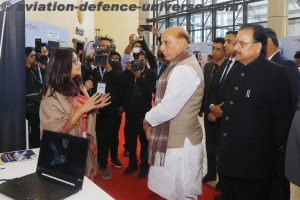 “Under offset, we are acquiring technology from various countries through Foreign Direct Investment (FDI). But, like this, we cannot obtain best technologies as countries never share their latest innovations. This is why there is a need to develop the required technologies on our own. For this, we need research and development (R&D). There are a number of conditions that need to be fulfilled to establish a productive R&D ecosystem. India has a large workforce of energetic and skilled youth who are committed to taking India forward in the field of technology. When we have such a skilled workforce, we should not shy away from setting ambitious goals. Our youth are fully empowered to make India self-reliant in the defence sector, and the government is providing them with the environment to touch greater heights,” the Defence Minister said.
“Under offset, we are acquiring technology from various countries through Foreign Direct Investment (FDI). But, like this, we cannot obtain best technologies as countries never share their latest innovations. This is why there is a need to develop the required technologies on our own. For this, we need research and development (R&D). There are a number of conditions that need to be fulfilled to establish a productive R&D ecosystem. India has a large workforce of energetic and skilled youth who are committed to taking India forward in the field of technology. When we have such a skilled workforce, we should not shy away from setting ambitious goals. Our youth are fully empowered to make India self-reliant in the defence sector, and the government is providing them with the environment to touch greater heights,” the Defence Minister said.
Highlighting the Government’s vision of attaining self-reliance as soon as it came to power, Shri Rajnath Singh said the nation cannot remain dependent on import of weapons/platforms as it can be fatal for strategic autonomy. He stated that without self-reliance, India cannot take independent decisions on global issues in line with its national interests.
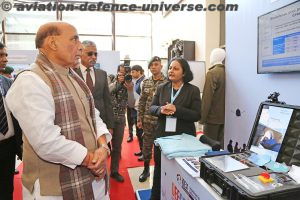 “Strategic autonomy can be maintained only when arms and equipment are made in India by our own people. We are working towards this, and the results are positive. While in 2014 our domestic defence production was around Rs 44,000 crore, today it has crossed the record figure of Rs one lakh crore, and growing continuously. This change took place due to our conistent efforts. Tough decisions had to be taken. Status-quo had to be disrupted,” the Defence Minister said, while listing out a number of measures taken to promote domestic manufacturing, including earmarking 75% of defence capital procurement budget for Indian companies.
“Strategic autonomy can be maintained only when arms and equipment are made in India by our own people. We are working towards this, and the results are positive. While in 2014 our domestic defence production was around Rs 44,000 crore, today it has crossed the record figure of Rs one lakh crore, and growing continuously. This change took place due to our conistent efforts. Tough decisions had to be taken. Status-quo had to be disrupted,” the Defence Minister said, while listing out a number of measures taken to promote domestic manufacturing, including earmarking 75% of defence capital procurement budget for Indian companies.
Rajnath Singh emphasised that governance and commerce or business are codependent and the private sector needs a platform to flourish, which is being provided by the Government to achieve the goal of strengthening the economy. “Many aspects such as law & order, healthy & skilled workforce, rule of law and research & development ecosystem are needed to provide a platform for the private sector. Society and the government together provide these requirements so that the private sector moves forward and boosts the productivity & capacity of the economy,” he added.
The Defence Minister highlighted the efforts being made by the Government to achieve ‘Aatmanirbharta’ in defence production, including notifying positive indigenisation lists of major platforms & equipment that are being/will be manufactured in India. He suggested to the DDP that “in the coming 4-5 years, we should come out with a short negative list containing items that will be imported and we should strive to eliminate that list to achieve complete self-reliance”.
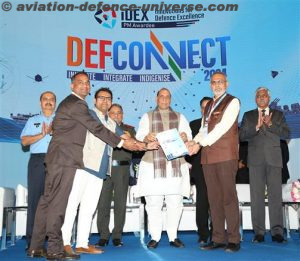 As part of DefConnect 2024, a technology showcase was also organised by iDEX-Defence Innovation Organisation (DIO) with a diverse range of technology start-ups at the forefront of innovation in the defence sector. These start-ups are revolutionising key areas such as Artificial Intelligence and Robotics, Undersea Detection and Communication, Unmanned Aerial Vehicles, Wearable Technology, Blast & Ballistics Proof Structures and Equipment, smart textiles and cyber security. These start-ups represented cutting-edge technologies and innovations, offering solutions to enhance defence capabilities, strengthen national security, and safeguard national interests. The showcase underscored the immense potential of the Indian innovation ecosystem in contributing to defence technology.
As part of DefConnect 2024, a technology showcase was also organised by iDEX-Defence Innovation Organisation (DIO) with a diverse range of technology start-ups at the forefront of innovation in the defence sector. These start-ups are revolutionising key areas such as Artificial Intelligence and Robotics, Undersea Detection and Communication, Unmanned Aerial Vehicles, Wearable Technology, Blast & Ballistics Proof Structures and Equipment, smart textiles and cyber security. These start-ups represented cutting-edge technologies and innovations, offering solutions to enhance defence capabilities, strengthen national security, and safeguard national interests. The showcase underscored the immense potential of the Indian innovation ecosystem in contributing to defence technology.
As part of a broader discourse on diversity and inclusion in defence entrepreneurship, DefConnect 2024 hosted a thought-provoking panel discussion on ‘Women as Drivers of Change’. The discussion explored the pivotal role of women in shaping the future of defence innovation and strategies to further promote gender diversity in the sector. The panel witnessed various noted participants from the Department of Space, Indian Air Force, Financial institutions and start-ups. The discussion offered insights on the Indian Defence Landscape, Technology, Future Trends, Innovation, and opportunities for the Indian start-up ecosystem. In recognition of the invaluable contributions of women entrepreneurs to the defence innovation ecosystem, DefConnect 2024 featured a special felicitation ceremony for iDEX women entrepreneurs.
In addition, DefConnect 2024 witnessed the launch of a rolling iDEX internship program, aimed at nurturing young talent and providing them with hands-on experience and mentorship in defence innovation. This initiative seeks to groom the next generation of innovators and equip them with the skills and knowledge necessary to contribute effectively to the defence innovation ecosystem.
 Furthermore, as part of its ongoing efforts to foster investment in defence start-ups, iDEX announced Memoranda of Understanding (MoUs) with new investors under the iDEX Investors Hub (IIH). These partnerships will facilitate increased investment in defence start-ups, providing them with the necessary capital and support to scale their ventures and drive innovation in the sector. These strategic partnerships have now taken the pledge to funds, from Rs 200 crore to more than Rs 500 crore.
Furthermore, as part of its ongoing efforts to foster investment in defence start-ups, iDEX announced Memoranda of Understanding (MoUs) with new investors under the iDEX Investors Hub (IIH). These partnerships will facilitate increased investment in defence start-ups, providing them with the necessary capital and support to scale their ventures and drive innovation in the sector. These strategic partnerships have now taken the pledge to funds, from Rs 200 crore to more than Rs 500 crore.
Highlighting the success stories of iDEX start-ups, the ceremony also featured the announcement of investments in iDEX winners and the felicitation of iDEX winners, showcasing their innovative solutions and entrepreneurial spirit. MoS(Defence) Ajay Bhatt, Chief of Defence Staff General Anil Chauhan, Chief of the Air Staff Air Chief Marshal VR Chaudhari, Defence Secretary Giridhar Aramane and other senior officials of Ministry of Defence were present on the occasion.
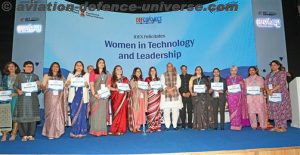 The launch of the ADITI Scheme, DISC 11, and other initiatives during DefConnect 2024 underscores the Government’s unwavering commitment to promote innovation, entrepreneurship, and self-reliance in defence production. These initiatives are poised to accelerate India’s journey towards becoming a global leader in defence technology and innovation, ensuring the nation’s security and sovereignty in the years to come.
The launch of the ADITI Scheme, DISC 11, and other initiatives during DefConnect 2024 underscores the Government’s unwavering commitment to promote innovation, entrepreneurship, and self-reliance in defence production. These initiatives are poised to accelerate India’s journey towards becoming a global leader in defence technology and innovation, ensuring the nation’s security and sovereignty in the years to come.


















